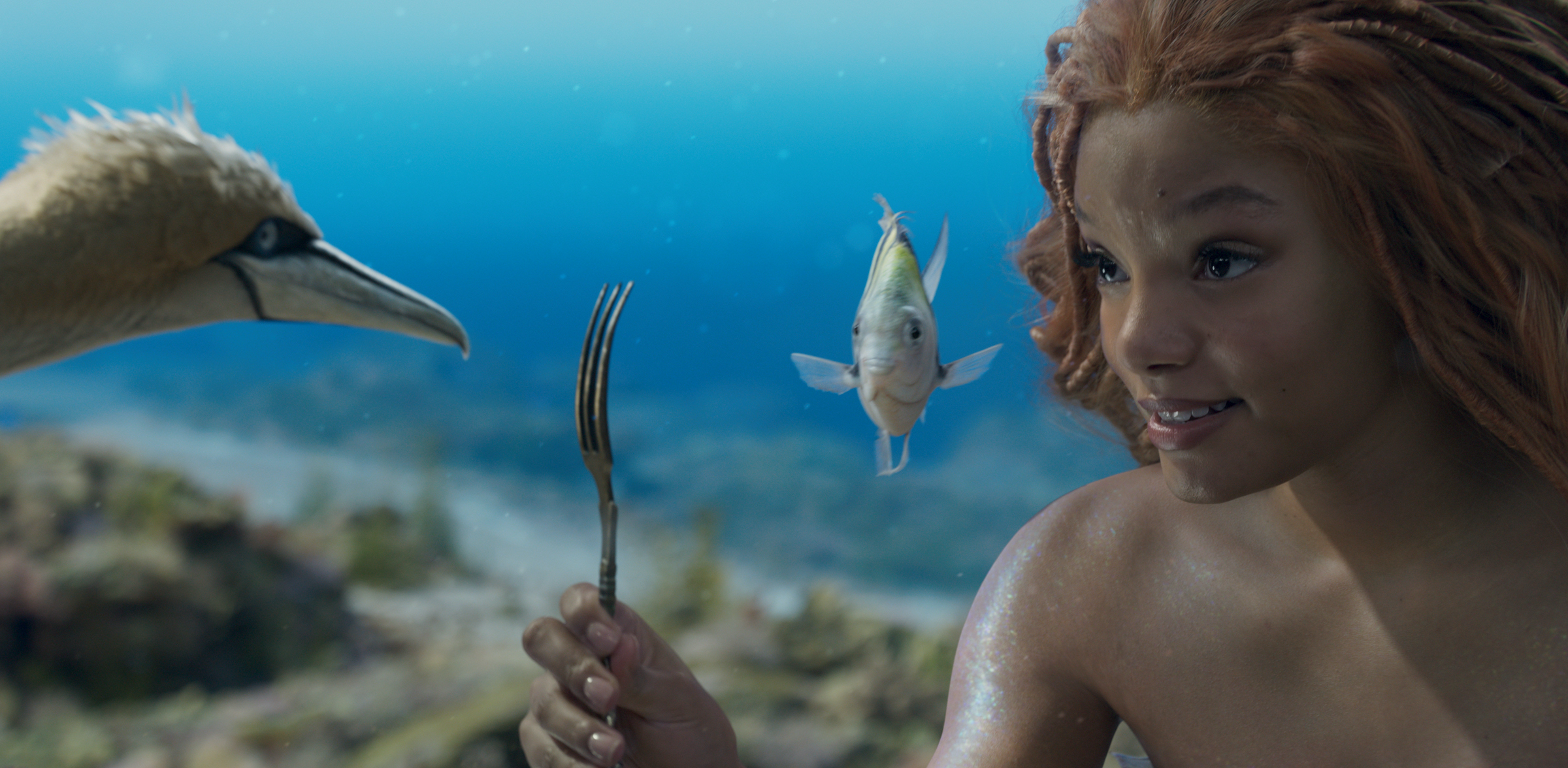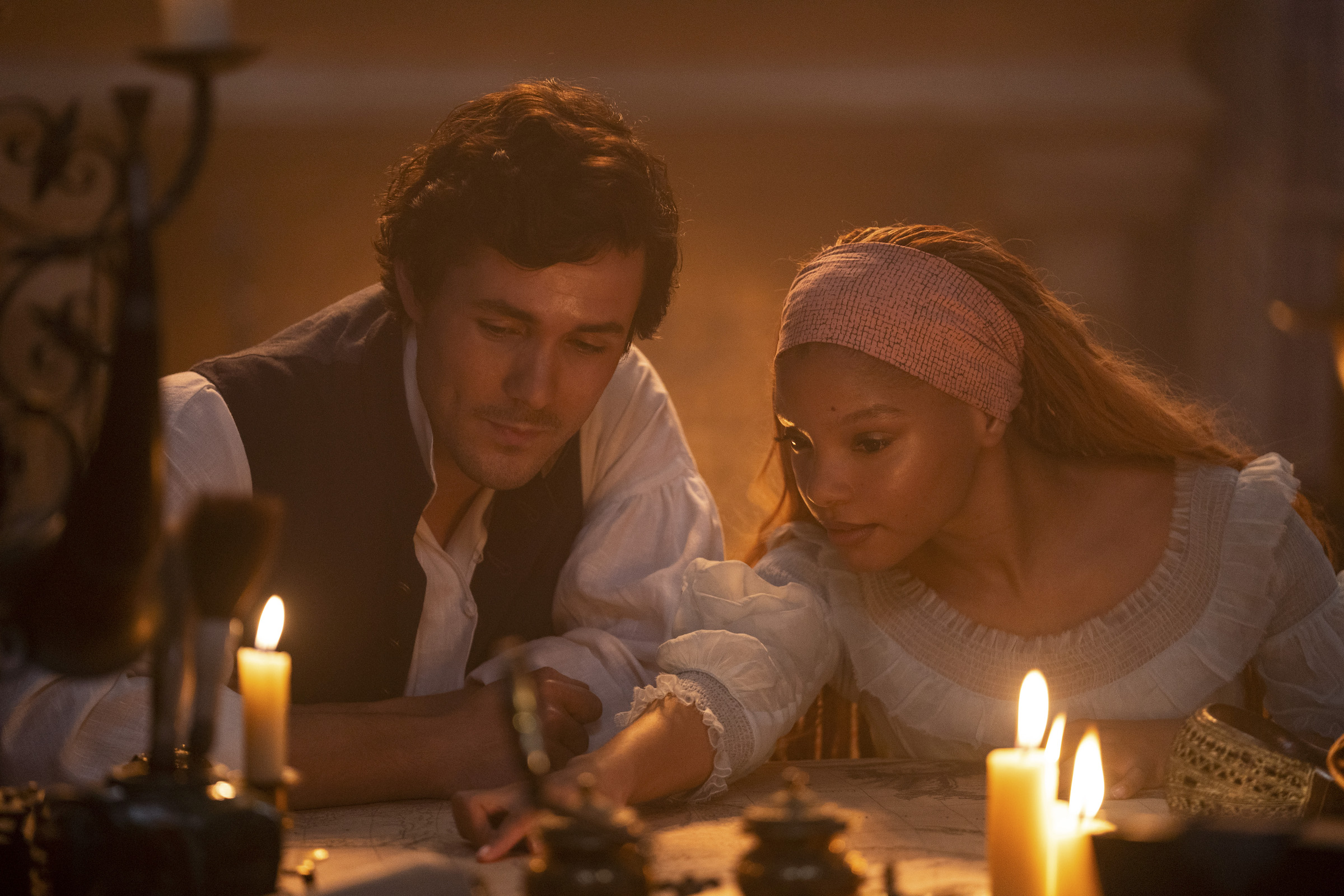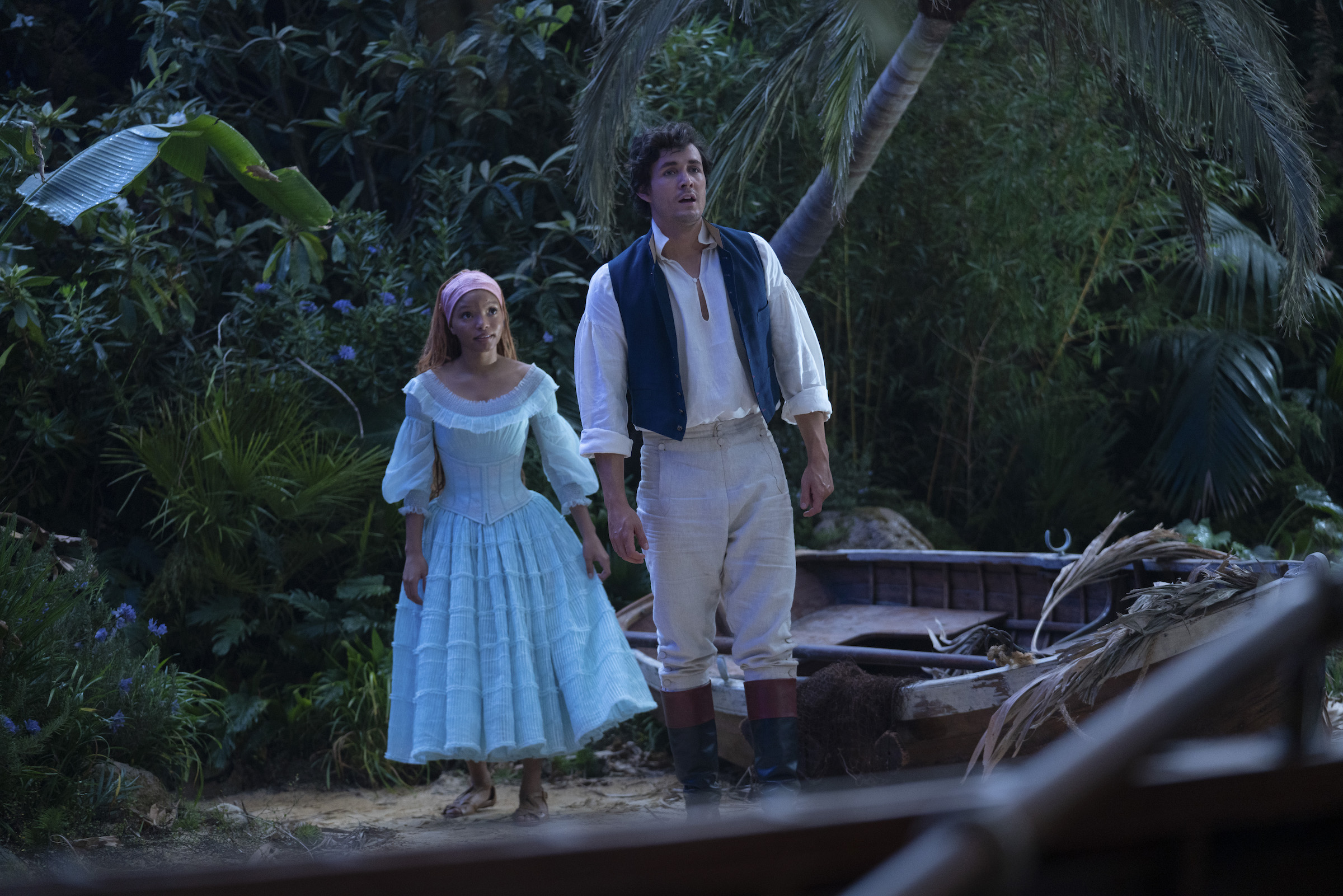Thirty-four years ago, Disney released what would go on to become an American classic: the animated Little Mermaid, its titular role voiced by Jodi Benson. On Friday, the half live action, half CGI Little Mermaid remake (now starring Halle Bailey) opened in theaters—though critics seem to think that it hasn’t been properly updated for the new century, or changed enough to warrant a reboot.
Most of the plot remains the same: a curious, adventurous mermaid princess wants nothing more than to become human and explore the world above. But some mostly minor tweaks do remain: the villain becomes an octopus rather than a squid, a new royal character enters the picture, and a few new musical numbers crop up. Read on for 10 tweaks to the watery tale.
There are three new songs
Alan Menken, 73—one half of the duo that created the iconic original Little Mermaid soundtrack—returned to the live-action production to helm its score. In 1989, Menken won the Best Original Score Oscar for The Little Mermaid and the Best Song Oscar for “Under the Sea,” the latter shared with lyricist Howard Ashman. The live-action score includes three new songs—“For the First Time,” “Wild Uncharted Waters,” and “Scuttlebutt”—for which Lin-Manuel Miranda wrote lyrics.
Each song showcases the vocal abilities of its performers: “For the First Time” chronicles Ariel’s (Halle Bailey) first steps in the human world. “Wild Uncharted Waters” is Eric’s (Jonah Hauer-King) big solo about wanting to leave his island and explore the world. And “Scuttlebutt,” a classic Miranda number, is a rap between the seagull Scuttle (Awkwafina) and the crab Sebastian (Daveed Diggs) detailing the day’s gossip.
Lyrics get an update
With modern times (and live action and CGI) come modern lyrics. Two sonic mainstays of the movie—“Kiss the Girl” and “Poor Unfortunate Souls”—got an update this time around. The former was changed to make consent an active part of the scene. “Possible she want you too, there is one way to ask her” became “Possible she want you too, use your words, boy, and ask her” and “It don’t take a word, not a single word” became “If the time is right, and the time is tonight.”
“There are some lyric changes in ‘Kiss the Girl,’” Menken told Vanity Fair. “Because people have gotten very sensitive about the idea that [Prince Eric] would, in any way, force himself on [Ariel].”
He added, “We have some revisions in ‘Poor Unfortunate Souls’ regarding lines that might make young girls somehow feel that they shouldn’t speak out of turn, even though Ursula is clearly manipulating Ariel to give up her voice.” In the latter song, a whole verse is removed, including the famous “body language” line as well as “they dote and swoon and fawn/ on a lady who’s withdrawn/ it’s she who holds her tongue who gets a man.”
Jodi Benson, who originally voiced Ariel, was all for the modifications. “We’re talking about starting our [voiceover] sessions in ’86 [for the original film],” she told Entertainment Weekly. “It’s 2023, so we have to grow, we have to learn, we have to be aware of our surroundings.”
Scuttle is a different species

Scuttle (Awkwafina)—one of Ariel’s trio of loyal friends, alongside Sebastian the crab and Flounder the fish—is no longer a seagull. Now, the dimwitted but lovable character has become a northern gannet, a type of diving bird that can stay underwater for up to half a minute while hunting and can dive as deep as 70 feet. For plot purposes, this allows Scuttle to visit Ariel underwater (and explain what, exactly, a dinglehopper is), rather than having Ariel visit the forbidden surface.
Sebastian’s profession
Sebastian (full name Horatio Felonious Ignacious Crustaceous Sebastian) is introduced in the 1989 movie as the “distinguished court composer” of King Triton’s kingdom. (He then proceeds to conduct a concert showcasing the talents of King Triton’s daughters, minus the errant Ariel.) In the new film, however, Sebastian seems to be less musically inclined—although he still spearheads a technicolor production of “Under the Sea”—and more focused on his role as the king’s trusted servant. We also lose a fun musical standoff between Sebastian and a French chef, employed by Prince Eric’s palace, who wants to serve him up for dinner—presumably because of its rather violent nature.
Ariel’s sisters take more action
In the animated original, we meet Ariel’s six sisters—Attina, Alana, Adella, Aquata, Arista, and Andrina—very briefly at the beginning, as they perform Sebastian’s masterpiece. Together, Triton’s daughters represent the seven seas (Ariel presumably represents one of them too, although we aren’t told which one.) In the updated version, Ariel’s sisters—renamed Karina (Kajsa Mohammar), Tamika (Sienna King), Mala (Karolina Conchet), Caspia (Nathalie Sorrell), Perla (Lorena Andrea), and Indira (Simone Ashley)—have slightly bigger roles. The women reunite with their father for the annual Coral Moon, rather than the concert. They help him clean up the kingdom after yet another shipwreck, are sent out on a search party when Ariel goes missing, and later see Ariel off to her new future.

Prince Eric’s backstory
One of the most significant overhauls to the plot of the story is embodied by Prince Eric’s (Jonah Hauer-King) new number, “Wild Uncharted Waters.” The prince, newly fascinated with exploring the outside world beyond the borders of his kingdom—not unlike Ariel—is fixated on sailing the “wild uncharted waters/ Beyond where man can see/ When your eyes outshine the horizon line.”
Director Rob Marshall, producer John DeLuca, and screenwriter David Magee altered the storyline to give Eric and Ariel more things in common: Now, they share a burning curiosity and desire to break out of their respective bubbles. In this iteration, Eric was also washed ashore in a shipwreck as a baby and adopted by his parents, the king and queen. “I wasn’t born to all this,” he tells Ariel of his kingdom. “And it all makes me feel a little uneasy.”
Meeting the queen
Although we never see Eric’s father in the new movie, we do meet his mother, the queen, played by a regal and self-assured Noma Dumezweni. (In the 1989 film, Eric’s parents are out of the picture.) The queen functions as a grounding presence, the sage foil to her son’s youthful restlessness, urging him to stay home and tend to the kingdom that he already has.
An added layer to Ursula’s story
Under the sea, another royal got a new relative. Ursula (Melissa McCarthy), who had previously simply been banished from the kingdom, is now King Triton’s (Javier Bardem) estranged sister. That adds an extra layer of malevolence to her plot to ensnare Ariel, given that the princess is now her niece. And as the wicked cherry on top, the sea witch adds a little something extra to her spell this time: She ensures that Ariel won’t remember the conditions she needs to meet to remain in the human world.
Read More: How Drag Culture Inspired The Little Mermaid’s Ursula
On a superficial level, Ursula has changed too: She used to be half woman, half squid, meaning she had six tentacles rather than eight, which, according to original Ursula voice actor Pat Carroll, made her less expensive to draw and animate. But now, with a $250 million budget, the sea witch can afford the full eight tentacles. In 2023, Ursula is an octopus.
Ariel has agency
The biggest, most important change happens to our hero, Miss Ariel. The way Halle Bailey plays her, the mermaid has more agency and control over her own story. Although she still can’t speak for the three days that she’s on land, she does sing a few numbers—“For the First Time” and a couple of “Part of Your World” reprises—in her head, narrating her reality in her own way.
When Ursula comes ashore in human form disguised as Vanessa (Jessica Alexander), she wears Ariel’s voice—the price she paid for her legs—around her neck in a shell locket. In the original, Scuttle snatches the locket off her neck and shatters it, releasing the voice to its rightful owner. In this edition, Ariel does it herself. And she takes matters into her own hands, too, when she steers a ship straight into Ursula, defeating her—something that Eric did before.
“We’ve got to be aware of our growth as humans and what’s important now and what maybe isn’t as important,” Jodi Benson, the original Ariel, told Entertainment Weekly. “Things change. We’ve got to roll with that.”
“You’ve got to have growth,” Benson said. “It’s very important to stay relevant with where we are, what’s going on around us. We need to be aware. So the adjustments and the fine-tuning that they needed to do, it was a must, but it was done in a beautiful way, and I’m very, very thrilled with it.”

The island gets a new look
Prince Eric’s kingdom has gotten a makeover. In the animated film, the unnamed realm had a Mediterranean sensibility, and the town square felt European, reminiscent of Beauty and the Beast’s “Belle” song and scene (“There goes the baker with his tray like always.”) Now, the focus has shifted to the kingdom’s island nature, with passing references to Cartagena, on the Caribbean coast of Colombia, and other Latin American countries. We still can’t quite pinpoint the region on a map, but Ariel and Eric dance with locals on a sandy, tropical beach.
More Must-Reads from TIME
- Donald Trump Is TIME's 2024 Person of the Year
- Why We Chose Trump as Person of the Year
- Is Intermittent Fasting Good or Bad for You?
- The 100 Must-Read Books of 2024
- The 20 Best Christmas TV Episodes
- Column: If Optimism Feels Ridiculous Now, Try Hope
- The Future of Climate Action Is Trade Policy
- Merle Bombardieri Is Helping People Make the Baby Decision
Contact us at letters@time.com